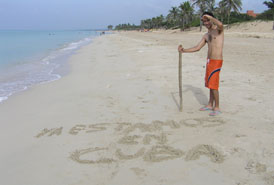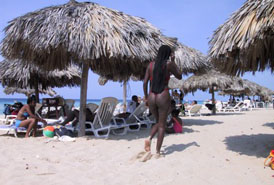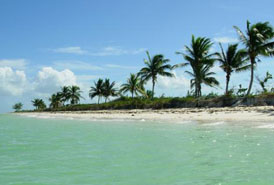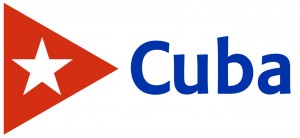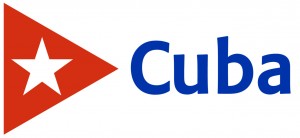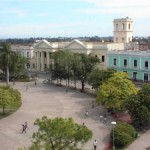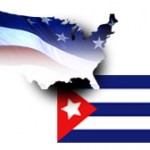Playa Santa Maria del Mar Havana
Playa Santa Maria del Mar
Playa Santa Maria del Mar is one of the best spots. It’s a $12 ride from Havana Centro or Vieja to Playa Santa Maria del Mar, add $2-3 from Havana Vedado or Miramar, and a $16 ride from the airport – airport cabs may try and charge more so ask for the ride to be metered. If you´ve taken a rent a car in Cuba then driving here from Old Havana is about 20 mins, tops
The Playa Santa Maria del Mar beach is wide, long and sandy and there are fair water sports facilities as well as deep-sea fishing, though diving is limited. The waters of the north coast tend to be more surfy than the south and the sea is reasonably safe, though take local advice.
“Amazing beach cabanas Playa Santa Maria del Mar”
At weekends Cubans throng the Playa Santa Maria del Mar beach, playing volley-ball and dancing Salsa to live bands. There are also steady streams of chicas, though the police have clamped down
You will know when you get to the main hotel, the Tropicoco, because it looks like a chemical weapons research facility. It’s a T-shaped, reinforced five-storey concrete building on the quiet road which runs along the beach – a classic piece of ’60s Soviet engineering, built for fraternal Eastern-bloc delegations and ‘Friendship Tours’ of trade-unionists. Maintenance is not all it might have been and the food is dire (don’t get conned into an all inclusive package or the $26 full-board and free drinks deal).
But Hotel Tropicoco is fairly cheap and above all the rooms are comfortable, with cable TV. Tropicoco is bookable through packages, or on a hotel-only basis through Cuba-specialist agents. Typical rates are around $30pn single including (basic) breakfast or $45pn double. You should be able to get this down to $30pn double with group bookings or for a week’s stay.
Hotel Atlantico a few hundred yards to the west is right on the beach, has better food and rooms, but tends to be full of tour groups. Rooms from $40-$80.
If the beach in front of the hotels gets crowded, walk a few hundred yards in either direction or you should have plenty of sand to yourself. There is a moderately good beach bar and restaurant on the beach (don’t use the hotel’s own). A small tourist supermarket opposite the hotel is relatively well-stocked. The Chinese on the main coast road above the hotel ($3 taxi ride) is surprisingly good – about $10 a head. There are several other slightly smarter hotels at Santa Maria. A club 200 metres east of the Tropicoco warms up around midnight. It often has live Salsa and plenty of Cubans go there, though you may find that most are after your dollars rather than your body – or even your mind.
See all the Hotels in Santa Maria del Mar
Playa El Megano a mile closer to Havana has Villas Los Pinos, a small hotel with villas which can cost up to $300 a night for four-bedrooms. Guanabo, three miles further up the coast from Playa Santa Maria del Mar has a local farmer’s market at Avenida 5 and 494 where you can usually find fresh fruit.
Playa Santa Maria del Mar 101
Playas del Este Havana
Playas Del Este – Havana’s South Beach
To the east of Havana on the north coast, a 15 minute drive from central Havana on a reasonable dual-carriageway, lie 10 miles of white beaches, the Playas del Este : Havana’s South Beach.
The Playas del Este resorts are still little more than villages and are far more basic than the main tourist beach resort of Varadero (of which more later). They are also largely undiscovered by Westerners who tend to be packaged off to Varadero. Cubans have access to the Playas Del Este, though this can be limited by the police.
The Playas closeness to Havana makes them ideal for combined Havana and beach vacations. You can stay in Havana and easily get to the beaches, or stay in the cleaner air of the beaches and quickly get into Havana. Cab fares to and from Havana are around $12-16. If you are driving with a Rent A Car in Cuba , the road-signs are at best confusing and at worst non-existent.
“Playas Del Este all Chicas from Havana”
The main towns are Guanabo, Playa Santa Maria del Mar, Playa El Megano, Santa Maria Loma, Playa Bacuranao and Playa Tarara.
Playas Del Este Havana 101
Beaches in Cuba
Beaches in Cuba
There are three types of Beaches in Cuba : great beaches effectively reserved for Western tourists; great beaches where Cubans and tourists can go; and some pretty terrible beaches.
“Top 10 best beaches in Cuba?”
When Cuba opened up to tourism in the early ’90s The Castro Brothers became concerned that Westerners would pollute Cuban ideology and vice-versa. So they decreed that some resorts and Beaches in Cuba would in effect be foreigner-only – usually those in front of tourist hotels. Many of these have become tourist ghettos – you might as well not be in Cuba. There are, however, good Beaches in Cuba where Cubans and travelers can mix – just. Here is your guide to some of the good, the great and then don’t waste time with…
Beaches in Cuba 101
Cuba Rent a Car Thanksgiving
Cuba Rent A Car organized yet?
As the Holiday season approaches and thanksgiving is almost upon us and our Canadian friends get ready for their own long weekend just before Christmas for the Remembrance Day weekend organizing our Cuba Rent a Car is a must. Some Cuba Rent A Car offers have come in from both CubaCAR and REX that can only be described as “crisis beaters”
CubaCAR has introduced Cuba Rent A Car reductions of 15% for vehicles booked online for both the weekends of November 11th thru 14th with any additional days being discounted by 10%. See the CubaCAR offer here
REXCUBA has introduced a similar Cuba Rent A Car discount covering November 24th thru 28th of 10%. Again, any supplementary days on the same contract are applied the same discount but, the intent is obviously to cover thanksgiving. See the REX Car rental offer here.
“Tip: Book your Cuba Rent a Car before Nov 15th”
Transtur has also waved drop off fees for Cuba Rent A Car bookings in December which is the only reduction available for now for this month. Therefore if it was your plan to drop your Cuba Rent A Car off in a different province in December, now could be a good time to book.
Similar Cuba Rent A Car discounts are expected for the December Holidays and New Years so stay tuned..
Discounts Cuba Rent a Car
Rent a car in Cuba from Tampa
How to Rent a Car in Cuba from Tampa?
Rent a car in Cuba from Tampa
How to guarantee a Rent a car in Cuba from Tampa to collect when I arrive? Confirming your Rent a car in Cuba from Tampa requires visiting the official webpages of Havanautos, CubaCAR, VIA or REX, making a reservation and paying for it online with your credit card. You will receive a voucher like this in your email which, upon presentation will locate your prepaid vehicle. After signing the contracts you will be free to go with your car.
Why pre-book a Rent a car in Cuba from Tampa?
During high season there can be very few vehicles available in Cuba. In fact, finding a car can mean traveling to various rental offices to check availability. Unlike the U.S each office is not connected to a central system to allow them to check availability in another office. Therefore, it’s more like a crap shoot as to whether you find a car available or not. This can cause serious delays in your plans especially if you need to meet family in another location.
If I use the websites to book my Rent a car in Cuba from Tampa is it 100% certain?
Yes. Providing the booking was done on the official websites and you have received the correct voucher then the car is 100% certain. In fact, the car is taken from all inventories and cannot be sold/seen by the local offices. Essentially, when the car is booked and paid online there can be no doubt that the car is available.
Can I pay my Rent a car in Cuba from Tampa with my U.S credit card?
Yes. Your card is accepted online through international banks.
What if I don´t Rent a car in Cuba from Tampa and simply show up at the airport?
If you enjoy high risks, play poker or have plenty of time and are willing to bribe the rental office (with money) they may be able to call around the other offices and find you a car. If you need more than one car or a specific size then buena suerte!! However, you will certainly have to travel to this office outside the airport in a Taxi incurring extra cost plus, the car will be more expensive than online rates.
Is it cheaper to Rent a car in Cuba from Tampa?
Yes. Rates are cheaper online than those provided at rental offices. Also, you will need cash to pay the car if you wait until arrival and your U.S credit card won’t work… This means you will invariably have to stand in line at the CADECA exchange office, pay the exchange rate plus the 3.6% (they charge) and also suffer the 10% penalty imposed by the Cuban Government to convert US Dollars. Therefore, before you even begin to pay the car, you will have lost 14% which is far in excess of any online or Visa or Mastercard rates of exchange from the U.S and online.
Can I book any car when I Rent a car in Cuba from Tampa?
Yes. All the current models are shown on the websites and they can be booked, in advance, ready for your arrival. You can also add things like extra drivers or child seats to your online order so as to make the collection process faster.
Can I prepay insurance when I Rent a car in Cuba from Tampa?
No. Insurance is always payable upon arrival for any car rental reservation in Cuba. You should factor in this amount when you book your car and, ensure you have this small amount in hand ready.
What are the key benefits when I Rent a car in Cuba from Tampa?
• Immediate express collection upon arrival
• No waiting in line, collection lines are separate to the standard lines
• Guaranteed vehicle of the pre-booked category/model
• Big savings on “walk up” rates
• Big saving on exchange rates and the Cuban USD 10% penalty
• Complete Piece of mind
• Security you and your loved ones will be on your way quickly
• Immediate resolution of any difficulties
• Prepaid service with guaranteed vehicle when you arrive
To Rent a car in Cuba from Tampa visit one of the official websites of
All the websites are the same as Transtur is now the owning company of all the aforementioned brands. This makes booking a similar process throughout.
Overall, booking you Rent a car in Cuba from Tampa is a no brainer. It takes minutes to reserve online which can remove hours from your time in Cuba trying to find a car like a needle in a haystack. Furthermore, getting your Rent a car in Cuba from Tampa ensures a locked in rate which cannot be changed or increased if/when daily rates rise. The Cuban government has the knack of imposing higher and higher rates or, what they call “extrema alta” rates when they know that few cars are available. This increase can be as much as 30% higher than published rates for the same vehicle! Therefore, prepaying your Rent a car in Cuba from Tampa “locks in” your rate as the car is already paid meaning you will not suffer these fluctuations.
Finally, for those traveling with elderly family members, meeting elderly family members, yound children or lots of baggage the risk of NOT booking a Rent a car in Cuba from Tampa for outweighs the small amount of time it would take to get piece of mind and know the car is waiting when you arrive.
Have a great trip and hasta luego!!
Rent a car in Cuba from Tampa 101
Cuba People to People travel
Cuba People to People travel
Traveling to Cuba without a specific license from the treasury department became easier this year because of Cuba People to People travel. Not since the Clinton years has the situation been as it is today. Basically, so long as the visitor has a valid reason to visit Cuba which is not purely touristic in nature then no permit is required. The ideas with Cuba People to People travel is that Americans meet and socialize with Cubans of all levels as a means of enlightenment for both parties of their specific cultures, ideals and human values.
For some, the reoccurrence of Cuba People to People travel is seen as a sign that the travel ban is about to be lifted and for others its simply another backward step to policies already in place the last time the democratic party was in the Whitehouse.
However you see it, traveling to Cuba is now rather simple. Well, not as simple for an American as visiting any other nation but, simpler than it was.
One key location to obtain up to date information on the policies between USA and Cuba and, Cuba People to People travel is The Havana Note . Sometimes quite technical for those taking a first look however, once familiar with the general glossary, rules and situation, it can make for interesting reading. Furthermore, It is constantly updated with recent news and developing policy changes.
Now, back to Cuba People to People travel, what the Obama administration searches is a return to hopes to give more U.S. citizens an opportunity to talk to Cubans. But not be involved in tourist visits. One would beg to question how the two cannot overlap at some point during a visit but, so long as the “tourism” side of trip remains hush hush, it seems that visitors fly under the radar. Notwithstanding, adhering to the people-to-people guidelines for most of your trip is a better option overall.
Now, the new Cuba People to People travel measures make it easier for United States citizens who do not have special status as working journalists or scholars to visit Cuba legally, so long as they go with a licensed operator or third country provider. But who are the licensed operators for Cuba People to People travel ? Well, several such as Insight Cubal NY and Distant Horizons have acquired US Treasury licenses but, some say the package prices are very expensive and that similar packages are available to nationals of other nations (Canada for instance) for less than half the amount. Obviously, being the first to sell such offers “legally” means they can charge a premium but, what about OFAC´s wording on who can sell such trips and services to Americans? Below is an excerpt:
“Americans who are authorized to travel to Cuba by general or specific license are free to make travel and program arrangements through a provider in a third country”
Traveling to Cuba via a provider in a third country under a general license is therefore easier than many think. Categories such as the following fall directly into a general license scenario
- Members of international organizations of which the United States is also a member (traveling on official business).
- Full-time professionals, whose travel transactions are directly related to research in their professional areas, provided that their research: 1) is of a noncommercial, academic nature; 2) comprises a full work schedule in Cuba; and 3) has a substantial likelihood of public dissemination.
- Full-time professionals whose travel transactions are directly related to attendance at professional meetings or conferences in Cuba that are organized by an international professional organization, institution, or association that regularly sponsors such meetings or conferences in other countries.
So let’s look at the “GENERAL LICENSE” scenario for Cuba People to People travel which requires no application, no permission, and no prior approval from Washington to travel to Cuba. The individual or academic/religious institution simply complies with the spirit and intent of the regulations. Therefore, a general license is a “no Application” license.
So, if your profession or research could benefit from a trip to Cuba and you are willing to log your trip (just in case you are questioned) then visiting Cuba could be a “do-it-yourself” trip without the need for the hefty prices of packages from the US. You could quite easily put the trip together yourself under the banner of Cuba People to People travel. But how can you do this without breaking any rules?
First off, you have two choices on how to book the trip. Either use an “approved” TSP (Travel Service Provider” or go it alone.
“Cuba People to People travel TSP or Third Country?”
We´ll concentrate here on going it alone.
OFAC rules, in simple terms, say either use a TSP or make travel and program arrangements through a provider in a third country for your Cuba People to People travel
Third country? Why three?
Well, the term refers to Cuba, USA and Country X, Country X being the third country. ALL Americans are prohibited; with or without a license from purchasing or organizing any travel services, whatsoever, with ANY agency or entity with a physical presence in Cuba. This includes both Cuban wholly owned travel companies such as Cubanacan or Cubatur and ALSO any foreign agency/entity with a physical presence in Cuba. Sometimes Americans become confused when analyzing this area of rules so, we´ll simplify.
Let’s say you you are investigating your Cuba People to People travel options and you type into Google “Cuba Hotel Reservations” to book a hotel. Up comes the first page with 10 options. The options you see must be checked to see whether these companies are located in Cuba. A big give away is an address but, also phone numbers in Cuba. The main mistake made, however, is seeing a company that is based in say Canada AND Cuba then assuming that because they are in Canada you can call Canada to book. This is not true. If the Canadian agency (or UK, France, Mexico, for that matter) is physically present in Cuba then they are deemed by OFAC and the Treasury department as “nationals of Cuba” and thus, are out of bounds for us Americans. You will read things like “your credit card will not mention Cuba” or “we bill you through Germany” but, this makes absolutely no difference on a purely legal standpoint. The bottom line being, you booked with an agency who has a physical presence in Cuba, whether they are also in Canada, UK or even China makes zero difference to OFAC. They are nationals of Cuba as they are in Cuba, thus illegal for us to use.
When planning your Cuba People to People travel, you will need to apply this rule to every part of your planning, whether it is Car Rental, Hotels, Tours, Transfers or whatever other service you feel you need. Booking and paying for these services with a company physically present in Cuba is illegal and can bring severe penalties, ruining your option of traveling under the aforementioned “general license” plus, leaving you open to possible legal problems. Why take the risk?
But, how will they (OFAC) know, you may ask? Well, if you are traveling under the auspices of a general license to comply with the Cuba People to People travel, technically you are doing nothing wrong and you may be asked to justify your trip. Both why you thought you met the criteria and what you did (photo logs, notes, blog entries, study materials etc) but, more importantly, how you got there, who you paid and what you purchased. This last part is where, if you used an agency physically present in Cuba as opposed to a provider in a third country you will invariably have violated the law.
Therefore, do your research. If you see addresses or phone numbers in Cuba take a wide birth, there are many more alternatives out there. Most foreign operators with a physical presence in Cuba are there to serve non Americans and thus, their operations are entirely legal under their countries legal system but, NOT OURS.
Ban on Americans by the Cuban Government
In the latter part of 2008 and, again in January 2010, Cuba introduced strict rules banning any foreign or national travel providers, with a physical presence in Cuba, from selling services of any type to Americans. These rules are iron clad and imposed by the countries MINTUR (Cuban Ministry of Tourism) who also administer the annually renewable licenses these agencies require to operate on the island. No fines are levied to violators but, after one warning their operating licenses can be revoked. You´d think that with these types of rules in place many of these agencies would not wish to take the risk but, alas, they do and sometimes with dire consequences for the American traveler. We´ll explain; every hotel, car rental agency or other service provider in Cuba is bound by the rules of the MINTUR. Therefore, if an American shows up at a Hotel or Car Rental office with a service voucher issued by one of these agencies physically present in Cuba the services are often times not honored and you will be left stranded without your accommodation, Car or other service. This is especially bad for Americans because, we have an extremely difficult time obtaining money in Cuba. Imagine being there and all your prepaid services are useless…Cases such as these are increasingly vented on sites such as Tripadvisor, Lonely Planet and other travel forums where Americans, with seemingly valid reservations were turned away by the Cuban host.
An example of a booking made with a Cuba based operator for an American.
“I was refused entry to a hotel with my gf that I stayed at two months ago and had a pre-paid voucher with both our names on it” See review
Flights seem to be another point of contention with us Americans jumping through unnecessary hoops to get a ticket. Again, putting Cuba Flights into Google brings up the first 3 options who are Cuba based agencies with whom an American is prohibited from using but, further down sites with .uk, .eu, are abundant and offer flights without much, if any, difference than booking from the likes of Expedia or Travelocity a flight to NY. Stories of Americans sending western union cash to Mexico or Canada are rampant online. One has to ask why? When any European travel website will sell these tickets without the slightest problem…
Cuba People to People travel is therefore veiled in fables and intrigue but, in reality, is no more difficult than booking travel to say Peru. Admittedly, the lack of US based offers is daunting but, those who remember the days of travel agencies will recall a much more complicated scenario than today’s “point and click” booking platforms.
Probably the best way of adhering to the rules is to search for a trip which includes the maximum amount of the Cuba People to People travel guidelines. These include giving the least amount of your American dollars to Cuban enterprises which, invariably, all hotels, car rental companies and official services are. One such method would be using Casa Particulares and staying at one of the 1000´s of private accommodations offered by Cuban families. Probably the pinnacle of people-to-people travel, due to the fact that you´ll be living, essentially, with a Cuban family who have created private living quarters for quests at their homes. The bulk of your money goes to them and a small portion to the government in taxes. Exactly what the Obama administration intended.
So we´ve covered several Cuba People to People travel myths here. There is nothing stopping you, or very little stopping you, from taking advantage of a people-to-people trip right now, many say before the whole country changes, allowing you to see the “real Cuba” which, as we Americans know, is steeped in history and intrigue by us all.
As a final word, all links to travel suppliers shown on this blog are third country operators and thus entirely legal to use. We have verified each one and found them to comply as NOT being present in Cuba. The exceptions are the aforementioned TSP´s who do not need to be verified because we know they have already been approved by OFAC. Explore the blog to find the various suppliers which meet this criteria.
Cuba People to People travel 101, made easy
Santa Clara Cuba
Santa Clara Cuban Americans
Havanautos Rent a Car Santa Clara Cuba, CubaCar Rent a Car Santa Clara Cuba, Transtur Rent a Car Santa Clara Cuba and Via Rent a Car Santa Clara Cuba are the three principal car rental companies based in this Eastern province of Villa Clara Cuba.
The main visitors to this region are Cuban Americans and, Cuban migrants in general, who are returning to visit family and friends and often Rent a Car in Santa Clara Cuba.
Rent a Car Santa Clara Cuba has various collection points for vehicles such as Abel Santa Maria airport, SNU Santa Clara which receives direct flights from the United States.
CubaCar Santa Clara offices can be found at Center’s Traffic and La Union Hotel
Havanautos Santa Clara offices in Santa Clara are Hotel Santa Clara Libre, Remedios, Placetas, Trista y Amparo, Caibarien
Rex Santa Clara can be found at the airport Abel Santa Maria airport, SNU Santa Clara
Rent a Car Santa Clara Cuba starts from 43$ per day increasing to 146$ per day for a 9 seat van when you Rent a Car Santa Clara Cuba
History of Santa Clara
Santa Clara, founded by just 175 people in July 1689. One hundred and thirty-eight of them were two large families already inhabiting in the area and, thus, owners of the land next to the new city. The remaining 37 came from 7 other families, a priest and a governor, all of them originating in the seaside city of “San Juan de los Remedios”. The population of Remedios was torn between the option of leaving their city, constantly bothered by incessant pirate attacks, or staying in place. Though most of them finally decided to stay, those 37 persons traveled south and, on 1st June, 1689 they arrive at the hill where they rejoined with the other two existing families. A mass was given under a Tamarind tree and the city was created. Since then, the place under the tree is known as “Loma Del Carmen” (Carmen’s Hill). A 2nd generation church exists in a beautiful park along the place with a monument commemorating the event surrounded by a fourth generation Tamarind tree.
In the beginning, the settlement was called Cayo Nuevo, later Dos Cayos, Villa Nueva de Santa Clara, Pueblo Nuevo de Antón Díaz, Villa Clara and ultimately Santa Clara.
“the only way to see the city is Rent a Car Santa Clara Cuba”
Building of the city began not far from Carmen’s Hill. Subsequently the Spanish standards, a perfect squared layout with a central plaza (Plaza Mayor today Parque Vidal) was developed. The first buildings erected were the Cabildo (City Council) and a modest palm tree church. This structure was enhanced in 1725 to a brick one, and stayed the center of the Parque Vidal until August 22, 1923 when it was demolished in order to expand the plaza and build a new church close by. In those times, and still nowadays, this decision, made by the mayor, was heavily criticized. The building, while not a paragon of architecture, was not entirely unpleasant to the eye and certainly an example of the older colonial structure in the city. Resulting from this expropriation by the City Council, a protest was raised by religious figures and a total of 77 850.00 pesos were paid in fines to the Church, a large sum that would represent millions of pesos today.
Some time later, the foundation, a theater, a chamber of commerce, meeting clubs, public libraries and dance halls were built as well. The position of the city, almost in the very center of the country, made it as a strategic point and a great communications link, East and West and also, North and South creating a slow but relentless growth. By the 19th century, Santa Clara was larger and more populated than the rest of the towns around, including what was once Remedios. As a necessary stop between Havana and the east of the country, the city gained the title of Las Villas province capital. Visiting Havana and surround areas requires Rent a Car Santa Clara Cuba.
Santa Clara Attractions
At Santa Clara’s city center is a park (Parque Vidal) and it is based at the entire square block. In the park there is a statue of Marta Abreu, a person much remembered by the people of Santa Clara. Around the park is the Santa Clara Libre (formerly the Santa Clara Hilton) which is where several rental offices are located for Rent a Car Santa Clara Cuba, “Gran Hotel”, Teatro de La Caridad (a National Monument of Cuba), the Plaza del Mercado Central, the former City Hall and the Colonia Española de Santa Clara center of dance, offers the most attractive and unique traditional customs of hinterland Cuba.
Parque Vidal is probably one of the most typical places in Cuba and can be visited when you Rent a Car Santa Clara Cuba. During the afternoons, people (specially singles) visit the park to meet others. Although not widely practiced in recent times, the custom was to walk the park around and around. The women walk the inner part of the park, while the men walk the outer side. Another lost custom was for the locals to set up a platform and offer improvisations with their guitars on late Sunday afternoons. For that day they dressed with their Guayaberas and highly polished shoes.
Santa Clara is home to a mausoleum which houses the remains of Che Guevara and sixteen of his fellow combatants killed in 1967 during the Bolivia campaign. There is also a reconstruction of Guevara derailing the train during the Battle of Santa Clara. Other locations concerning Che Guevara can be visited by car when you Rent a Car Santa Clara Cuba
Prior to 1 January 1977, Santa Clara was located in Las Villas Province. On that date, as part of a general administrating reordering of Cuba’s provinces, Las Villas province was reordered into the provinces of Villa Clara, Cienfuegos, and Sancti Spíritus. Santa Clara is in the province now known as Villa Clara. Cienfuegos and Sancti Spiritus are a short distance away when you Rent a Car Santa Clara Cuba
Other local landmarks include:
• Parque del Carmen (Carmen’s Park)– City’s Foundation Site.
• Parque de los Martires (Martyrs Park).
• Parque de la Pastora (Our Lady Shepherdess Park).
• Parque de la Justicia (Justice’s Park).
• Parque del Tren blindado (The Armored Train Park-Museum), a National Monument of Cuba.[4]
• Mausoleo Che Guevara (Monument and Mausoleum of Ernesto “Che” Guevara).
• Catedral de Santa Clara de Asis (Saint Claire of Asis Cathedral).
• Boulevard 1889.
• Centro Cultural El Mejunje (Cultural Centre “El Mejunje”).
• Loma del Capiro, hill overlooking the city
• University “Marta Abreu” of Las Villas is the province’s secondary education institution.
Popular Hotels Near Santa Clara (some require Rent a Car Santa Clara Cuba to be reached)
Rent a Car Santa Clara Cuba 101
Flights to Cuba Tampa & Fort Lauderdale
Flights to Cuba from USA
Getting Flights to Cuba from Southwest Florida may no longer require a two-hour drive to Miami to be able to Travel to Cuba
On Monday, the U.S. Customs and Border Protection approved Southwest Florida International Airport to operate specialized Flights to Cuba. It was one of 12 airports, including Ft. Lauderdale and Tampa, to receive the designation nationwide.
Previously, only three airports were authorized for Flights to Cuba between the US and Cuba: Los Angeles International, Miami International and New York City-based John F. Kennedy International.
But those hoping to visit family and friends in the island nation will still have to make the drive east to fly out of Miami International for the time being. The Fort Myers-based airport is not approved for normalized Flights to Cuba.
“No carriers are giving us regular service for Flights to Cuba as of right now,” said Victoria Moreland, public affairs director. “But this gives us the possibility to operate charter flights to Cuba for humanitarian relief, religious rights efforts or any other special reason.”
Moreland said receiving this approval gives the airport the opportunity to attract carriers should circumstances require flights to Cuba.
“It means we have the merit to be able to handle that international traffic,” she said.
Local Cubans are hoping that this will soon mean regular commercial Flights to Cuba will operate out of Southwest Florida as well.
“Too many people travel to Cuba from this area. And it’s always a pain to travel to Miami first,” said Irenia Torres, who left Cuba seven years-ago and has lived in Naples for six years.
If Southwest Florida International started operating regular Flights to Cuba, she said she knows people who would fly there monthly.
Flights to Cuba “it’s always a pain to travel to Miami”
Until this year, those of Cuban descent were not permitted to travel to Cuba more than once every few years. As part of President Barack Obama’s effort to reach out to the Cuban people in support of their desire to freely determine their country’s future, he directed that all international airports apply to operate charter flights to and from Cuba.
To be eligible for approval, airports must be an international airport, have adequate staffing, equipment and facilities to process international traffic and must have an Office of Foreign Assets Control carrier service provider that is prepared to provide flights between the airport and Cuba. Southwest Florida International received its approval as part of that initiative.
Claudia Morales, a waitress at World Bakery and Cafeteria, a Golden Gate-based Cuban cafe, agreed that she would visit Cuba if it was less of a hassle to travel there. Morales left Cuba with her family at age six and has yet to go back.
She would like to fly there with her Cuban husband who came to the US when he was 15.
“We just haven’t had the time or the money to go to Miami and then fly there,” Morales said. “I’ve heard you need at least $1000 to cover Flights to Cuba, customs and taxes before you can even step foot in the country.”
Southwest Florida International is still far from operating regular, commercial flights to Cuba but the new designation gives it the opportunity to make the quick, 40 minute trip if the need arises.
“If and when the restrictions on Flights to Cuba ease up, the airport will be fully equipped and prepared to handle the travel to Cuba,” Moreland said.
Flights to Cuba from USA 101
Americans Helping Cubans
American going to Cuba?
Whatever your reasons are for visiting Cuba, whether it is simple curiosity or a lifelong yearning of pent up desire from having been prohibited from visiting there; our government has made it clear that what they want for the Cuban people is liberty. Not just of expression but also freedom to make decisions on their own without the big brother of communism knocking at the door. The latest easing of American restrictions by the Obama administration are clearly linked to nurturing those objectives by specifically empowering Cubans. It should be no surprise that by allowing ANY AMERICAN to send money to Cuba and, not just those with family there, has empowerment focused undertones. So, if you do travel to Cuba how can you add your grain of sand to the democratic sand castle? We all want Cubans to benefit from our presence in Cuba but how can we do this?
First off we need a history lesson and, some simple facts. The newer generations of Americans are unaware or ill informed about what communism means. For some, the concept is inconceivable, especially if we´ve lived our whole lives in a free market society and democracy but, some of the things that communism means are the following:
- Government owns all business, even the corner store
- Government controls all media only broadcasting or writing positive things about themselves and negative propaganda about adversaries
- Government controls the books you can obtain and read
- Government owns all property, even your home
- Government decides if you need a bigger house who you can “exchange” your smaller house with and no money can change hands as this is illegal
- Government employs most of the population
- Government decides who gets paid, who gets fired and who gets work
- Government banishes detractors from society and sometimes imprisons them
- Government owns your car
- Government decides what you can buy at their stores and, how much these goods or services will cost
Etc, Etc, the list goes on….
The above are just a few points which are simply inconceivable as an American but, in Cuba, the above is the norm and has been this way for over 50 years.
So back to the topic, if we are to visit Cuba how can we empower Cubans?
Eating
We all need to eat and boy do we American´s know how to do it! However, it’s real easy for us to look at a nice restaurant and contemplate that the man looking sharply dressed attending to some patrons could actually be the owner, right? Well, in Cuba, any restaurant which is not a Paladar is wholly owned by the Cuban government and workers there are paid around 24 USD per month. Yes, 24 dollars… In fact, it’s quite disconcerting to know that the meal for two people you just paid, probably cost more than the whole week’s salary of two waitresses who served you. When Cubans who work for these restaurants can´t make ends meet and take some food home for their children they risk being fired or worse, being indicted by their own government for theft…(honestly) Therefore, while thinking of where to dine, bare a thought for this state of affairs, things are not always how they appear, especially in Cuba.
On the other hand, forced by the dire economic circumstances the government faces they have had no choice but to begrudgingly offer those Cubans, their communist system is unable to provide jobs for, a way of making ends meet. Enter the now infamous “Paladar”.
An American does not understand “Cubans make 24USD per month”
A Paladar is a restaurant usually situated in the home of a Cuban family. Cubans being entrepreneurial by nature have turned this slight easing of controls into a whirlwind success. And this despite the insurmountable odds faced when opening a business your government begrudgingly had no choice but to permit. Owners of Paladares, and you will hopefully talk to many of them, have to jump through hoops and tackle bureaucracy you only thought existed in movies… However, these are the people who are the fledgling generation a democratic Cubans
So, hopefully as an American you´ll need no coaxing to use Paladares as much as you can when dining out in Cuba. It’s not easy to shun these mythical places like Bodegita del Medio, El Aljibe or the Tropicana Cabaret, we know this but, by using these family owned restaurants you’re directly empowering the Cubans who work there, their families, relatives and friends, rather than a massive government tourism cash machine which controls everything.
Accommodation
All previously mentioned comments apply here. All hotels in Cuba are owned by the government. Don´t be fooled by the names of say Sol Melia, Barcelo or Accor Hotels that emblazon hotels in Cuba. These are simply management companies who have either leased for X years the property in question or, are simply guests of the Cuban government to run their properties while it suits them. Likewise, Cuban employees are paid the customary 24 USD per month but, conversely, foreign staffs are paid thousands of dollars per month while working side by side with their Cuban colleagues.
On the other hand, due to economic strife and also to tax Cubans who were (illegally) renting out their rooms to foreign tourists, long before this became legal, the Cuban government reluctantly allowed this form of private enterprise, again, begrudgingly tolerated.
Actually, few know that the licensing of Casa Particulars began three months prior to the 1998 visit of Pope John Paul II because the Cuban Government wanted to extend an olive branch of pseudo liberation to its people before his arrival but, also because at the time there were simply not enough hotel rooms in Havana to accommodate the throng of visitors. During the subsequent years a massive crack down ensued under the then Fidel Castro to try and eradicate this form of self employment. Thankfully, the attempt failed but many Cubans lost their family homes for having rented more than one bedroom etc. Very sad.
Today however, Casa Particulars are less of a stigma to the government, probably because in these very difficult times, they charge each home owner around 250 CUC (almost one year’s Cuban salary) per bedroom and per month in licensing duty. Yes, Cubans who rent out their bedrooms to you pay around 10 days of the nightly rent just to be able to do it.
With all this said, you should need no further enticing to stay at a Casa Particular whenever you can. The money you pay will help the Cuban families who have risen up as entrepreneurs to pay the draconian licensing rights but, above all, we Americans will show each and every Casa owner who Americans really are and what we are about. Whether it is a casual chat over breakfast or that special meal you offered to the owners as a thank you, they´ll receive one grain of your culture. This people to people exchange is precisely what Cubans need now, more than ever.
Getting around
We won´t beleaguer the point, you already got it, right? All rental cars, official taxis, buses and airplanes are owned, controlled and run by the government. When you rent a car for 3 times the monthly Cuban salary “per day” you are paying the government this money. Not the smiley gentlemen who kindly completed your contract and helped you carry your luggage. Same applies to every other “official” form of transport. However, as with the aforementioned cases, the Cuban Government got tired of confiscating cars from entrepreneurial Cubans who were simply trying to make ends meet by ferrying a few tourists around the town and begrudgingly allowed private taxi licenses. These are the sometimes beaten up cars that swerve in quickly when they see an obvious tourist and beg to take you “somewhere”. These private taxis, most of the time lacking the accoutrement’s of air-con, air bags and nice seats also pay “licensing” rights to the Cuban Government to use their own cars, fuel and time to try and make a buck. Using these taxis, although counter-intuitive, is again a way of getting your dollars straight to the Cubans who need them.
CUP payments
CUP or the Cuban Peso is the money Cubans use and get paid in at their government jobs. The second currency, created purely as a parallel tourist dollar to bilk visitors, is the CUC or Cuban Convertible peso. Cubans can´t afford to pay 1 CUC for a coffee because 1 CUC is more than one day’s salary to them. Yes, we know it sounds crazy but, your morning coffee at a government run slick tourist trap costs as much as the person who is serving it gets paid for that whole days work. However, this parallel system brings dividends to you as an American because; if you want to help real Cubans you can change 1 CUC into 24 CUP and get a coffee on a street corner for less than 5 cents. You´ll also be getting coffee where millions of Cubans have no choice but to get theirs with all the kudos that comes with mixing in with the general population. This is but one example but there are many more. For instance, if you’re on a budget and want a pizza or some rice and beans, these can be had on a street corner for less than 10 cents. The same food served (and often worse) at a tourist trap, although served on a nice clean plate will cost you 10-15 times more. Of course, there´s one very important point here though. When you pay in CUP to a Cuban street vendor you are paying him and him alone. He´s the one who gets the benefits of your hard earned dollars. Food for thought.
As an American “I did my part to help”
Gifts
That old Ipod you upgraded for new one with more gigabytes some years ago, the old film camera you have not used since you got the digital, your old shirts you no longer fit into, those sunglasses that went out of fashion last spring, they´re all remnants of our consumer society. In Cuba these items will be like gold, bringing smiles and friendship to all those who receive them. If it’s your first trip, don´t leave this until your next trip. You´ll wish you hadn´t a few days after arriving. It’s so hard to conceive just how few material items Cubans actually have. But you bet, they want more just like any other human being on our planet, they want betterment in life and material goods are the basic rewards we give ourselves through life. You´re old stuff will do just fine. Therefore, make the effort, clean out that draw, dig out those old boxes and take some small gifts with you. Don´t just hand them to your casa owner, he/she already has access to more foreigners than most people. No, go out, wander around and make some kid or person happy by giving. This is what we Americans are about, let us not forget this. Our generosity is world renowned so carry the flag, ok?
Over generosity
Don´t single out a few lucky ones and bombard them with gifts and trinkets. Beyond being the height of bad taste, it may also have the opposite effect you were trying to achieve. Instead of making the beneficiary happy he/she will become the envy of friends, family and neighbors. Sort of the “chosen one” if you like, this is obviously counterproductive because all Cubans should receive an equal dose of your limited hospitality if you are to earn respect and make the right impression. However, it’s easy to take a liking to just a few people but, we urge you to do everything in moderation. Be fair.
Final note
All forms of free enterprise in Cuba are begrudged by the government. Don´t think for a second that these have been allowed to liberate Cubans. Each and every one is a daily reminder to pro government Cubans that their system has failed and, this sentiment is made obvious by the officials who police these businesses each and every day via draconian rules imposed upon those Cubans who have decided to “go it alone”. So negative was the government image portrayed of these “cuenta propistas” or self employed some years ago that they inherited the name more commonly used by government supporters for Cuban Americans, the infamous “gusanos” or worms. While today, again due to these tough economic times, the government has endeavored to correct this image they themselves promoted some years ago, Cuban entrepreneurs still feel like outcasts. That is until you show up and make it all worthwhile…Right?
American in Cuba 101
American traveling to Cuba FAQ
American traveling to cuba FAQ
American traveling to Cuba information Q & A
Q. American traveling to Cuba, will my passport be stamped by Cuban immigration upon arrival?
A: NO. Your passport is not stamped the tourist visa is stamped and immigration keeps one copy and you the other. The part you have is then surrendered at departure.
Q. American traveling to Cuba, do I need Cuba´s compulsory travel insurance?
A. Yes. Citizens from all countries should have medical insurance when visiting Cuba and the failure to pre-purchase this insurance could mean being forced to buy it upon arrival. To buy insurance Click here.
Q. American traveling to Cuba, what is the tourist card and where can an American I get one?
A. First off all this is not a card, it is two pieces of carbon paper. One is kept by immigration on entry and the other is given to you then surrendered at departure. Getting a tourist card is rather simple. The agency you used will provide it or, the airlines sell them at check in for approx 20 USD when you depart to Cuba or, as a last resort, they are sold by immigration upon arrival and take seconds to complete.
Q. American traveling to Cuba, I´ve been told I need a hotel booking for my first night so I have an address for the tourist card, is this true?
A. No. There used to be an area on the tourist card to add the address you were staying at but, this has been removed and immigration no longer ask/care where you are staying.
Q. American traveling to Cuba, what can I take to Cuba and will customs hassle me for certain items?
A. Cuban customs are hot on communication equipment. Obviously, a personal cell phone is not an issue, nor is a fixed line telephone or one modem for personal use. However, more than one can be problem as it could be construed as non personal use. Electrical items that consume a lot of electricity like heaters or air-condition systems will attract duty. CD Players, personal music players, DVD players are not usually a problem but, again, lots of these items in your suitcase will attract duty/questions.
Q. I´m a Cuban American traveling to Cuba, will I have to pay duty on gifts I take for my family?
A. Sadly, Cuba still persecutes its own people when they return. Planes arriving directly from the US have special teams of customs officers deployed specifically to charge duty. If its clothing then they weigh suitcases and charge duty by weight, if it’s electrical items they have a list of items by category and charge accordingly. Many Cuba Americans report that the duty is as much as the cost of the items but they feel compelled to take gifts for family.
Q. I´m a Cuban American traveling to Cuba, will I have to pay duty on gifts I take for my family If am flying from another country than the US to Cuba?
A. If the flight you take is mainly a tourist flight then you may breeze through customs without any problems. If, however, you have a cart piled high with cases and look/speak/act Cuban when passing customs then they may get pulled aside and you will pay duty (based on weight).
Q. I am a Cuban American traveling to Cuba who left before 1972, do I need a Cuban passport?
A. Technically no. But you need a visa to enter Cuba, Cuban exiles that left Cuba before 1972 are able to obtain a visa from the Cuban government at a higher fee and with more extensive background checks. Some Cuban consulates, despite knowing that you do not need a passport will not issue a Visa and compel you to obtain a passport. The Cuban consulates in Australia are known to violate this accord and a few others around the world have sporadically obliged those not requiring a passport to obtain one.
Q. I am a Cuban American traveling to Cuba with an American passport who left Cuba after 1972, can I enter Cuba?
A. Yes but you need to obtain a Cuban passport from the Cuban interest section Washington D.C., DC 20009-4202, USA (202) 797-8518
Q. American traveling to Cuba, Can Americans stay at Hotels in Cuba?
A. Yes, Americans can stay at any hotel in Cuba either by booking in advance or paying directly at the hotel. Hotels in Cuba do not differentiate between nationalities.
Q. I am an American traveling to Cuba and will be staying with family/friends in Cuba who do not have a licensed house for tourists, is this possible?
A. Yes. You will need to obtain a A-2 visa from immigration which cost 30-40 CUC. These visas are available at the immigration office closest to where your family lives. Obtaining one means going there in person with the owner(s) of the house and requesting one. They are (usually) issued on the spot. If you arrive late or outside normal administrative hours, go the next day, don´t wait several days.
Q. I´m an American traveling to Cuba, can I take my laptop to Cuba?
A. Yes. There is no problem taking a personal laptop and, while these used to be registered and then checked upon departure (that you took it back out), this has now stopped. Ideally, you could take a cheap laptop and leave it as a gift or sell it to finance your trip. They are worth a lot more in Cuba; even $200 older models can fetch reasonable prices.
Q. I´m American traveling to Cuba and visiting with a church, we are taking medicines and other items as gifts for Cuban´s, will we have a problem.
A. Yes and No. If your group has been authorized to visit Cuba as a religious group then you will have obtained a special visa which will exempt these items from scrutiny. However, if you are simply traveling as a tourist then these items may cause delays and ultimately, confiscation.
Q. I am an American traveling to Cuba to Cancun this week, and then fly to Havana the same day by way of Panama City. Do we need to be worried about having our passports stamped in Cancun, then a second time when we return to Cancun via the same route a week later? Will US Customs and Immigration be concerned about two entry stamps to Mexico and no third country stamped?
A. No. This is an urban myth and something which ended at least 7 years ago. US immigration couldn´t care less anymore about this. Quite simply, it’s not a problem anymore.
Q. I´m an American traveling to Cuba who plans to stay in Cuba for 10 weeks. Can I do this? My tourist card is only for one month. Do I need to apply for a Tourist Card extension?
A. Yes. Although tourist cards are for one month an extension can be obtained for a subsequent 30 days at the local immigration office. The cost is 25 CUC and extending is just a formality. You can later extend again for the final part of your stay in the same way.
Q. My father is Cuban but I was born in USA, do I need a special visa to enter Cuba?
A. No. Your father will need to obtain a Cuban passport if he left Cuba after 1972 and, if he left before, a Visa from the Cuban Interests section. You do not need any type of visa to visit Cuba but, should you not be visiting on a general license, you will need to request a family permit from OFAC.
Q. As an American traveling to Cuba can I take donations for the Cuban people?
A. When an American traveling to Cuba takes gifts or donations, unless part of a specific organization which has been approved by both the US Treasury Dept (OFAC) AND the Cuban Interest section to make donations on the island then these gifts should be small pseudo personal items.
American traveling to Cuba 101




